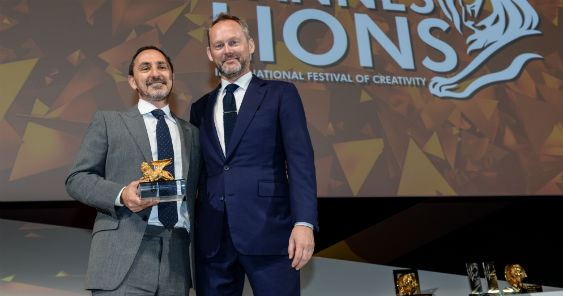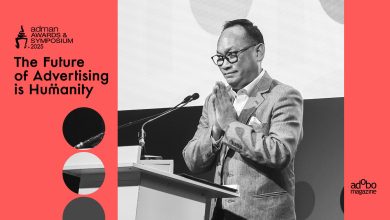Despite the heights David Droga and his multi-awarded agency, Droga5, has reached, the Australian native and now Lion of St. Mark awardee, attributed his success to simple yet core elements — being scrappy and feisty in the ad industry, doing the hard work, perfecting the craft, learning scale, and caring for the work, the people, and the impact the work can make on the world.
David Droga’s storied career is the envy of many ad men and women. Many wanted to be called the “David Droga of *insert place here”. As of today, he has more than 70 Gold Lions and 15 Grand Prix And Titanium Lions under his belt. His work includes the “Still Free” “stunt” for Ecko Unltd, “The Great Schlep” for the Jewish Council for Education And Research during the 2008 US elections, the multimedia partnership between Jay Z and Microsoft for “Decode Jay Z”, Prudential’s “Day One” mini-documentaries, and just recently, the goose-bump inducing “Rule Yourself: Michael Phelps” ad for UnderArmour.
While his genius is undeniable, Droga emphasized that his success was built on years of learning from the best creative people and agencies in the world, on being scrappy and staying involved and excited in the creative process, and on having brilliant partners and colleagues who had the same vision as he did.
David Droga was born in Australia and started his career in the said country. As an ad man in a smaller market, said Droga in his Lion of St. Mark interview, he had to be competitive and a little scrappier and feistier than those in primary markets. “You are desperate to prove your worth outside of your market,’ he stressed. This is why creatives from smaller countries come up with great work and spectacular ideas, according to Droga.
“The size of an idea is more important than the size of a budget,” he said of the challenge the creative and industry faces in smaller markets with smaller budgets. “Sometimes, having restrictions, I think, is a fantastic foil for creativity, having to push up against something.”
At the age of 26, Bob Isherwood hired Droga as Regional Creative Director of Saatchi Asia. His stay in the office in Singapore taught him hard work. “My experience in Asia really gave me value of hard work — it was almost like two years there is five years anywhere else — and also exposure to people from all over the world and their thinking,” he related. After two and a half years in Singapore, Droga moved to Saatchi London where he learned appreciation of the craft.
When the Saatchis were bought by the Publicis Groupe, Maurice Levy appointed Droga as Worldwide Chief Creative Officer. However, Droga found that he wanted to be closer to the creative work. As an executive, he was far removed from the process. “It doesn’t mean I always have to be doing the creative work, but I have to be connected to it or close to it, either contributing or supporting or whatever. I was young and I wasn’t looking to retire,” he revealed.
While Droga did decide to put his own independent agency, he appreciated being part of organisations like Saatchi and Publicis. It was not just about the size, he said, and big being bad and small being good. “Great creative agencies are not just the responsibility of the creative leader or the agency. The management, the CEOs, they have to be fighting the same fight as you. It’s always dangerous when someone hires a creative person just as a silver bullet, but they don’t change the system in support of that, ‘cause that’s an artificial thing,” he shared.
Finally, in 2006, Droga put up his own creative agency named Droga5. At this point, he had to balance strategy, creative, and client servicing. Clients will not buy an idea based on creativity alone. “They (clients) should buy something because it’s right and it’s good for their business and answering what they need,” he said. He went on to tell the value of having a thought process and a solid basis behind the creative idea. “I always joke that every client comes to Droga5 for our creative, hires us because our strategy, and stays because of our accounts service and production department,” he said.
Droga5 has undoubtedly produced many groundbreaking and inspiring work. For Droga, it is also important to make an impact on the industry. “We can use our creativity to move the needle,” he said.
At the age of 49, Droga remains to be one of the youngest creative leaders in the industry, and he is not about to retire just yet. “In our hearts, we (creatives) like to be productive and relevant. We like to see things come to life, but we’re restless. It’s who I am, and I need to be contributing to things. I need to feel like I’m seeing either ideas out of my head or ideas out of the people I work with and seeing theirs come alive,” he shared. “I bluff at business because I love creative. I want to build a great business because it allows me to do more creative things with more spectacular people.”
As David Droga received the Lion of St. Mark in recognition of a significant and outstanding contribution to creativity in the industry, he cited the “spectacular people” who helped make Droga5 the agency it is today.
Yet, if there was one thing according to Droga that could sum up what a person and a career needs to be successful, it is caring.
In his acceptance speech, what was meant to be advice for his four children became an inspiring call for the industry. “Wanting something, wanting a career or wanting to make something, doesn’t really mean much. It’s about finding something you care about, because caring is the only thing that really matters. And I would put down everything in my career to the fact that I cared about what I do, and who I work with, and what I make, and the effect that they have. Caring makes you want to work harder. People can’t pay you to care. People can’t teach you to care. But when you find something you care about, you give it everything you’ve got, and you never settle, and you are always pushing to learn and do better and support those around you. All I’m trying to do in my career is care. And hopefully, you see that in the work,” he shared.
Finally, he said, ”I’m so impressed with some of the winners in the industry this year. Amazing. Makes me care more about the industry. Makes me care about outdoing it next year. It makes me care more about the industry because there are so many fantastic thinkers and doers in this place. That’s what we need to do: more than anything, to give a s***, work hard, and try and make beautiful, impactful things. And I’m not giving up yet, even though this award is very, very appreciated.”








